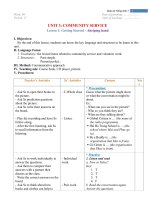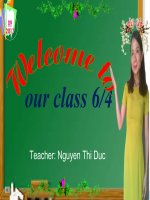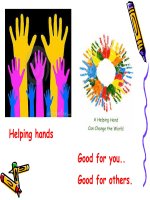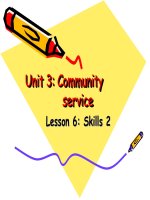Unit 03. Community Service. Lesson 5. Skills 1
Bạn đang xem bản rút gọn của tài liệu. Xem và tải ngay bản đầy đủ của tài liệu tại đây (1.23 MB, 15 trang )
Period 31.
Unit 4 MUSIC AND ARTS
Lesson 5. SKILLS 1
Period 31
Unit 4: Music and Arts
Lesson 5: Skill 1
*Pre-questions:
1.What type of musical instruments do we learn?
Guitar / saxophone/ cello/ drum….
2.What is Vietnam’s traditional musical instrument ?
Dan Bau………………
3. What kinds of traditional Vietnamese performance
do you know about?
Period 31:
Unit 4:
Vocabulary:
MUSIC AND ARTS
Lesson 5: Skills 1
- water puppetry (n): nghệ thuật múa rối nước
- puppeteer (n)
người điều khiển con rối
- strings (n):
những sợi dây
- control (v):
điều khiển
- emotional (a):
- melodic (a):
dễ xúc động
du dương
Period 31:
Unit 4:
Vocabulary:
MUSIC AND ARTS
Lesson 5: Skills 1
- water puppetry (n): nghệ thuật múa rối nước
- puppeteer (n)
người điều khiển con rối
- strings (n):
những sợi dây
- control (v):
điều khiển
- emotion (n) →
emotional (a):
cảm xúc →
dễ xúc động
- melody (n)→
melodic (a):
giai điệu →
du dương
Period 31:
Unit 4:
MUSIC AND ARTS
Check vocabulary:Lesson 5: Skills 1
- water puppetry (n):
du dương
- puppeteer (n)
nghệ thuật múa rối nước
- strings (n):
- control (v):
- emotional (a):
- melodic (a):
dễ xúc động
những sợi dây
người điều khiển con rối
điều khiển
Period 31 / Week 10
Unit 4 (cont)
MUSIC AND ARTS
SKILLS 1
Reading
Discussion
What kinds of traditional Vietnamese performance do
you know about?
Do you know about water puppetry?
Have you been to a water puppet show?
If yes, do you like water puppet show? Why?
Period 31 / Week 10
Unit 4 (cont)
MUSIC AND ARTS
SKILLS 1
Have you ever seen a water puppet show ?It is so special and fantastic
It’s a unique Vietnamese tradition.Children love the performance,and
tourists who come to Viet Nam greatly enjoy this kinds of art.
Water puppetry(Múa rối nước) is a traditional art form.It began in
the 11th century.
It originated in the villages of the Red River Delta of North Viet Nam.
The show is performed in a pool.The puppets are supported by
strings under the water and controlled by the puppeteers behind a
screen,so they appear to be moving on the water.The puppets are
made of wood and then painted.
The themes of the puppet shows are rural:the performances shows
everyday life in the countryside and folk tales.There are stories
about rice farming,fishing and Vietnamese village festivals.
1. Find the words in the text which mean:
Have you ever seen a water puppet show? It is so
special and fantastic. It’s a unique Vietnamese
tradition. Children love the performance, and
tourists who come to Viet Nam greatly enjoy this
kind of art.
Water puppetry is a traditional art form. It
began in the 11th century. It originated in the
villages of the Red River Delta of north Viet Nam.
The show is performed in a pool. The puppets are
supported by strings under the water and
controlled by the puppeteers behind a screen, so
they appear to be moving on the water. The
puppets are made of wood and then painted.
The themes of the puppet shows are rural: the
performances show everyday life in the
countryside and folk tales. There are stories
about rice farming, fishing and Vietnamses
village festivals.
1. special or
different = unique
2. started
= began
3. showed or presented
= performed
4. from the countyside
= rural
5. Events or
celebrations
= festivals
Period 31
Unit 4: Music and Arts
Lesson 5: Skill 1
* Answer the questions:
1.When did water puppetry begin ?
It began in 11th century
2. Where does a water puppet show take place ?
It takes place in a pool.
3. Who are the puppets controlled by ?
They are controlled by puppeteers .
4. What are the puppets made of ?
They are made of wood.
5. What are the water puppet shows normally about ?
They are about everyday life in the countryside and
about folk tales.
Period 31 / Week 10
Unit 4 (cont)
MUSIC AND ARTS
SKILLS 1
Have you ever seen a water puppet show ?It is so special and fantastic
It’s a unique Vietnamese tradition.Children love the performance,and
tourists who come to Viet Nam greatly enjoy this kinds of art.
Water puppetry(Múa rối nước) is a traditional art form.It began in
the 11th century.
It originated in the villages of the Red River Delta of North Viet Nam.
The show is performed in a pool.The puppets are supported by
strings under the water and controlled by the puppeteers behind a
screen,so they appear to be moving on the water.The puppets are
made of wood and then painted.
The themes of the puppet shows are rural:the performances shows
everyday life in the countryside and folk tales.There are stories
about rice farming,fishing and Vietnamese village festivals.
Period 31
Unit 4:Music and Arts
Lesson 5: Skill 1
* SPEAKING
Match the types of music in A with the adjectives to
describe them.
A
1.pop music
2. folk music
3. rock and roll
4. hip-hop / rap
5. blues
B
a. old,emotional
b. lively ,exciting
c. quick
d. sad,melodic
e. popular,pleasant
Period 31
Unit 4: Music and Arts
Lesson 5: Skill 1
* Ask and answer the following questions:
1.What kinds of music do you like best ? / Why?
I like blues best because it is sad and melodic
2. How often do you listen to music ?
I usually listen to blues music / I listen to blues music
after school
3. How is music useful to you ?
It helps me relax
4.Can you play any musical instruments ?
Yes,I can………./ No, I can’t
1x
2x
3x
10
15
14
13
12
11
9
8
7
6
5
4
3
2
1
1.Give
the names
Cello
of Vietnamese
,piano
instruments
X
O
2.Sing a song
in English
O
X
4x
5x
6x
1o
4. Talk for 15 second
about
what you see
when you visit
an art gallery
O
X
Sometimes;
5.How often do you
go tooften
a concert?
Tell about the last
concert you went to
O
X
My Tam or
Vinh Hung;
3.Who is your
Because
favorite
singer?
she/he sings
beautifuly
X
O
6.Who
is your
6.My
favorite
favorite
Vietnamese
Vietnamese
musician
musician
is…….? Why?
O
X
7x
9x
3o
4o
5o
6o
7o
Bùi Xuân Phái
8x
2o
7.Talk about 30
My favorite
seconds
about your
instrument
is
favorite
instrument.
….
O
X
O
X
8.Name one of your
favorite painter.
Name
( 9) :
Who
can draw
He/She
oftenthe
best
in your
class?
draws
………
What does
he/ she draw?
X
O
8o
9o
Period 31
Unit 4: Music and Arts
Lesson 5: Skill 1
HOMEWORK:
Learn the new words.
Practice reading again.
Do all the exercises again.
Do exercises 4 (page 30/ workbook).
Prepare: Skill 2.









